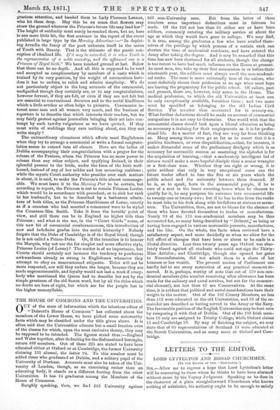THE HOUSE OF COMMONS AND THE UNIVERSITIES.
OUT of the mass of information which the laborious editor of " Debrett's House of Commons" has collected about the members of the Lower House, we have picked some noteworthy facts which may be classified under the title given above. It is often said that the Universities educate but a small fraction even of the classes for which, upon the most exclusive theory, they may be supposed to be intended. The figures stand thus :—England and Wales together, after deducting for the disfranchised boroughs, return 489 members. Out of these 225 are stated to have been educated either at Oxford or at Cambridge, the former University claiming 131 alumni, the latter 94. To this number must be added three who graduated at Dublin, and a solitary pupil of the University of Durham. Accounts must also be taken of the Uni- versity of London, though, as an examining rather than an educating body, it stands on a different footing from the other Universities. It has 14 graduates among the Members of the House of Commons.
Roughly speaking, then, we fin 1 243 University against
246 non-University men. But from the latter of these
numbers some important deductions must in fairness be made. Of the 246 not less than 64 either are or have been soldiers, commonly entering the military service at about the age at which they would have gone to college. We may find, it is true, among the graduates a few who have availed them- selves of the privilege by which persons of a certain rank can shorten the time of academical residence, and have entered the Army after taking the degree. And it may be remarked that this time has now been shortened for all students, though the change is too recent to have had much influence on the House at present. As most men, too, take up their first commission in or before their nineteenth year, the soldiers must always swell the non-academi- cal ranks. The same is more universally true of the sailors, who must definitely choose their profession at an age when most boys are leaving the preparatory for the public school. Of sailors, past and present, there are, however, only seven iu the House. The medical profession, to which the old Universities at least can be only exceptionally available, furnishes three ; and two more must be specified as belonging to the old Indian Civil Service. The number thus accounted for is seventy-six. What further deductions should be made on account of commercial occupations it is not easy to determine. One would wish that the commercial classes should look upon a liberal education as being as necessary a training for their employments as it is for profes- sional life. As a matter of fact, they are very far from thinking so. Many among them even go so far as to assert that it is a positive hindrance, or even disqualification,—that, for instance, it makes distasteful some of the preliminary drudgery which is as necessary for mercantile success as mastering the alphabet is for the acquisition of learning,—that a moderately intelligent lad of sixteen would make a more hopeful disciple than a senior wrangler or a first-class man. Whether they are right or wrong, it is quite evident that only in very exceptional cases can the future trader afford to lose the five or six years which the public school and the university between them demand. If he is, so to speak, born in the commercial purple, if be is sure of a seat in the inner counting-house when be chooses to qualify for it, he may postpone his entrance into commercial life to twenty-one or twenty-two ; but if he has to rise from the ranks he must take to his desk along with his fellows at sixteen or seven- teen. The Universities, then, are not to blame for the absence of those who have devoted themselves to trades or manufactures. Nearly 90 of the 170 non-academical members may be thus accounted for, so many being described by " Debrett,," as being or having been engaged in various mercantile pursuits, manufactures, and the like. On the whole, the facts when reviewed have a satisfactory aspect, and more decidedly so when we allow for the full effect of changes that have been or about to be made in a liberal direction. Less than twenty years ago Oxford was abso- lutely closed against all students who could not sign the Thirty- Nine Articles ; and Cambridge, though she opened her gates to Nonconformists, did not admit them to a share of her honours or her wealth. The present session of Parliament can hardly fail to see every restriction of any practical moment re- moved. It is, perhaps, worthy of note that out of 170 non-aca- demical members (the number remaining after allowance has been made for the military and naval services, but not for the commer- cial element), not less than 47 are Conservatives. At the sawe time, it is evident that political and social considerations have their weight in the matter. Out of the 187 County Members, no less than 112 were educated at the old Universities, and 33 of the re- mainder are described as having served in the Army or the Navy. The favourable position of the English Universities may be best seen by comparing it with that of Dublin. Out of the 103 Irish mem- bers 16 only are assigned to Trinity College, while Oxford claims 15 and Cambridge 10. By way of finishing the subject, we may state that of 60 representatives of Scotland 18 were educated at the Scotch Universities, and as many more at Oxford and Cam- bridge.


































 Previous page
Previous page